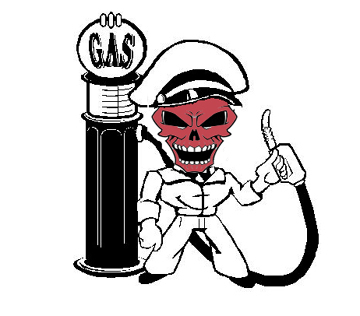The Oil Industry Has Been Poisoning Us For Decades, and They've Always Known It
 |
Oil industry has more ways to kill us than global terrorists...
but wait, they are them!
but wait, they are them!
 Marc J. Rauch |
Exec. Vice President/Co-Publisher
THE AUTO CHANNEL
Highly explosive gasoline, tetraethyl lead, MTBE, toluene, benzene, and the deadliest of all...WAR! These are some of the ways that the petroleum oil industry has killed us. By "us" I mean Americans, Canadians, Mexicans, Uruguayans, French, British, Irish, Swedish, Polish, Rooskies, Itais, Chinese, Japanese, Vietnamese, Sudanese, all of the these have been killed by or for petroleum oil fuels. Numbers not in the thousands or tens of thousands, but in the millions.
Tetraethyl lead's deadly characteristics have been known for years, even though the oil industry tried everything possible to hide the truth from the public, much in the same way that the tobacco industry tried to hide how dangerous tobacco smoking and chewing can be. But tetra-ethyl lead hasn't always been a component of gasoline, and in most instances in America it hasn't been used very much during the past two decades. Health concerns were finally addressed.
Unfortunately, for the public, what is still used in gasoline is benzene, and the oil industry would like to increase it's use by eliminating the use of ethanol (which was primarily adopted in recent years in place of tetraethyl lead and then MTBE).
So, what's wrong with benzene? Oh, everything. In the late 1940's the American Petroleum Institute sponsored a study of benzene. I presume they were hoping for a miracle finding that would absolve them of any guilt or responsibility for killing people. What they did, instead, was shoot themselves in the foot...well, both feet, and then they stepped on their own male anatomical part at the same time.
The report, called the API TOXICOLOGICAL REVIEW, was published in September 1948. It "summarizes the best available information on the properties, characteristics, and toxicology of benzene. It offers suggestions and tentative recommendations pertaining to medical treatment, medical examinations, and precautionary measures for workers who are exposed to benzene. It was prepared at the Harvard School of Public Health, Boston, Mass., under the direction of Professor Philip Drinker." The report was made available to me by the people at FixOurFuel.com and UrbanAirInitiative.com. The complete report can be found at http://fixourfuel.com/wp-content/uploads/2016/05/API-Benzene-Toxicology-Review-2.pdf.
The report cites various symptoms of exposure to benzene, including the final ultimate symptom of exposure to benzene...death. It discusses possible treatment for exposure, and it also sets forth the levels at which benzene can cause these symptoms and/or death to occur. The quantities range from very high exposure to relatively minute quantities, as permitted by government laws. It can go from 20,000 ppm (parts per million) in the air we breathe, to just 50 or 100 ppm. The upper quantities can result in immediate death, the lower quantities take a little longer.
The most critical part of the report, I think, is the part in which they give what they believe is a safe ppm amount of benzene in the air we breathe. The report states:
"Inasmuch as the body develops no tolerance to benzene, and as there is a wide variation in individual susceptibility, it is generally considered that the only absolutely safe concentration for benzene is zero."
Zero, as in NO safe level. As in there shouldn't be any concentration of benzene in the air we breathe. As TACH's editor-in-chief, Mark Fulmer, says about this, "Benzene is what helps give gasoline it's unique odor...it's the smell of death."
There are some who claim that we (the editorial "we") owe a debt of thanks to petroleum oil fuels; that we wouldn't have enjoyed such advanced living conditions without petroleum oil fuels. Their underlying supposition is that the cost of achieving such advanced living conditions is the price of an insignificant number of humans (100 million dead, for example, is statistically meaningless compared to the 100 billion that have lived since the invention of petroleum oil fuels).
The problem with that kind of thinking is that we don't owe any gratitude to petroleum oil fuels or the people who make it, we owe all the thanks to the people who invented the machines that use the fuel. The people who invented the original machines didn't invent them to be powered by petroleum oil fuels. Samuel Morey's internal combustion engine - perhaps the first internal combustion engine - was powered by a mixture of wood turpentine and alcohol. Rudolph Diesel didn't invent diesel fuel, he invented the diesel engine, which was powered by peanut oil. Nicholas Otto's more advanced internal combustion engine was also powered with an alcohol fuel.
It's only because petroleum oil fuels were given huge financial advantages that kerosene, gasoline, and petroleum diesel fuel became the primary fuels. They were not needed to advance the state of engine technology. In fact, gasoline could not and cannot be safely used in advanced engines (high compression engines) without the inclusion of ethanol or some other additive that emulates ethanol's anti-knock characteristics.
And what are those non-ethanol additives? Tetraethyl lead, MTBE, benzene and toluene - all poisons. The oil industry would like to turn back the clock on how and why ethanol was re-introduced into
common use in America; they want to replace ethanol with more benzene and toluene (incidentally, there's equally alarming studies about how dangerous toluene is, such
as
https://www.epa.gov/sites/production/files/2014-03/documents/toluene_toxicology_review_0118tr_3v.pdf.
The bottom line is that petroleum oil fuels were never needed; alcohol fuels could have done the same job and without all the loss of life attributed to the petroleum fuels and their additives. We don't need petroleum oil fuels now, but as long as they're there, for the foreseeable future, there's no reason why we have to suffer from the full consequences of that poison. The immediate acceptance of higher blend levels of ethanol-gasoline fuels will make it possible to meet all environmental/health goals almost immediately, not in 10 or 20 or 30 years. It will be a tremendous boost to our domestic financial condition, and it will diminish the threats from foreign terrorists.
We may still have had to fight a Great War, and then the 2nd World War, and the two Gulf Wars, and the War in Afghanistan, but maybe they wouldn't have been so deadly and so prolonged.
How dangerous are benzene and toluene? Watch these videos to see:
What surprises me is that with all the legal firms across America that are active in filing lawsuits against companies for asbestos poisoning, or faulty breast implants, or any one of a dozen other class-action issues, the oil industry continues to sell their poisons with relative impunity.
HERE'S SOME BONUS VIDEOS ABOUT THE DEADLY EFFECTS OF LEAD POISONING
SEE ALSO: Truth About Ethanol.


